Take a nocturnal journey with us as we explore the surprising, sometimes frightening, world of bees and their potential for nighttime attacks.

Can Bees Attack at Night?
In the serene darkness of the night, you might not suspect the buzzing threat of a bee attack. Indeed, you're probably familiar with bees as daytime creatures, busily buzzing from flower to flower under the sun's watchful rays. But, as you sit on your porch during a warm summer night, have you ever wondered if these tiny workers could turn nocturnal avengers?
It's a question that combines elements of entomology, the study of insects, with our natural human curiosity and, perhaps, a hint of fear. Let's explore this intriguing query, as we delve into the nocturnal behavior of bees and consider the possibility of a nighttime bee attack.
Key Takeaways
- Bees are generally not naturally nocturnal, but they become defensive when they sense a threat to their hive.
- Certain species, like the Africanized honey bee, can be more aggressive, especially at night.
- Weather conditions, particularly warmer nights, can make bees more active and defensive.
- Bees rely on their sense of smell and other senses at night, as their vision is not designed for darkness.
Understanding Bee Behavior
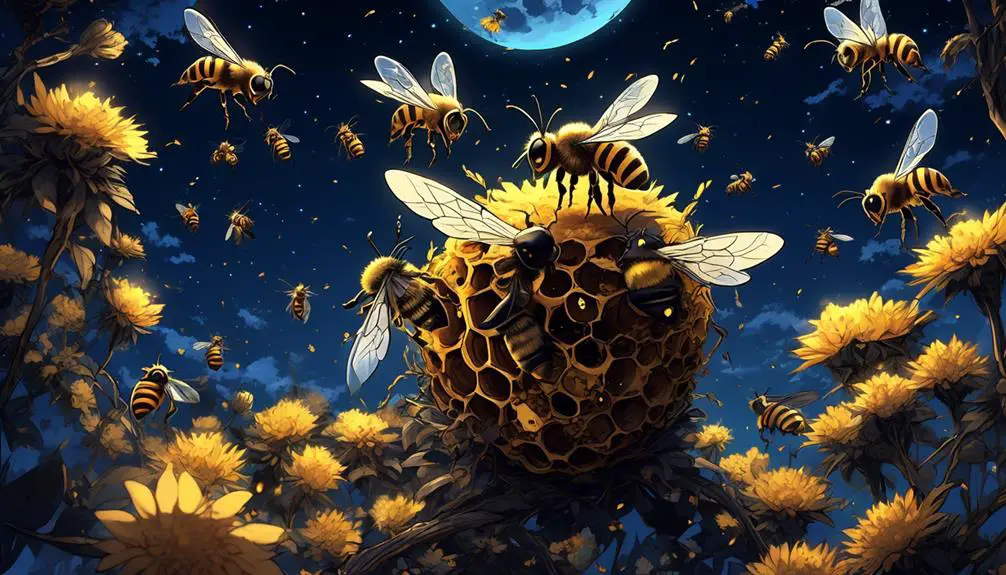
To fully comprehend why bees attack at night, you need to delve into their behavioral patterns, which are largely influenced by environmental factors and survival instincts. You see, bees aren't naturally nocturnal. They're usually busy during the day, collecting nectar and pollinating plants. But when they sense a threat to their hive, they can become defensive, regardless of the time of day or night.
Understanding this, it's crucial to remember that bees don't attack unprovoked. They're not out to get you; they're merely protecting their colony. If you've ever been stung during the night, it's likely you've unknowingly disturbed a hive. At night, bees are more likely to be in their hive, so any perceived threat can provoke a more pronounced response.
Also, several environmental factors can influence their behavior. Certain species of bees, like the Africanized honey bee, are known to be more aggressive and might attack at night. Weather can also play a role. On hotter nights, bees are more active and hence, more likely to sting. So, understanding bee behavior is key to comprehending nocturnal attacks.
Day Vs Night: Bee Activity
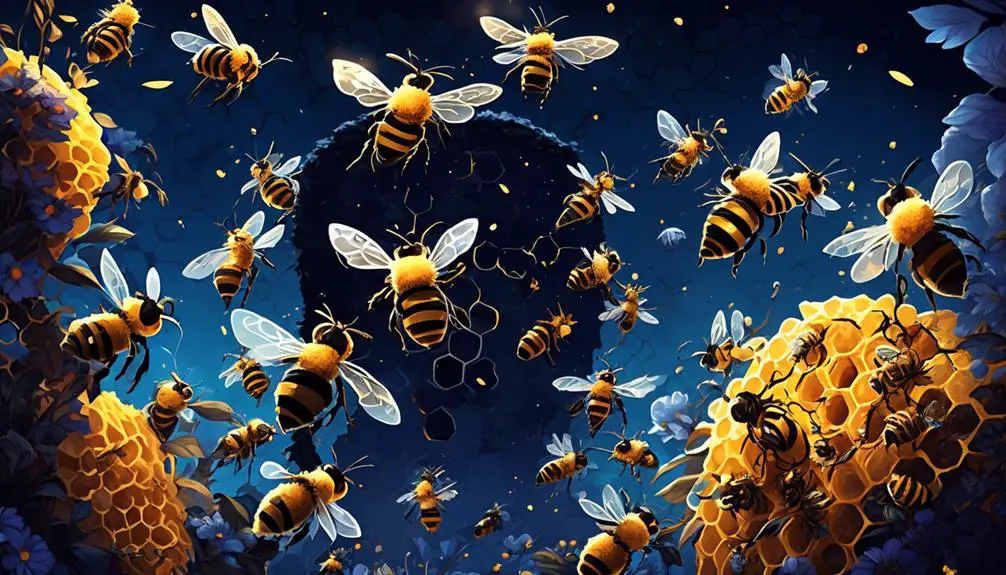
Exploring the differences between bee activity during the day and night can illuminate why these small creatures may be more likely to sting after dark.
During the day, bees are primarily focused on foraging for nectar and pollen. They're active, but not necessarily aggressive. Their mission is to gather food and return it to the hive, and they'll generally only sting if they feel threatened or if the hive is in danger.
At night, however, their behavior changes. Bees don't have good night vision, so they aren't out and about foraging. Instead, they're in the hive, protecting it. If you stumble upon a hive after dark, you're more likely to be seen as a threat. That's when they might attack. They're not out to get you, but they're on high alert, and their defensive instincts kick in.
It's also worth noting that some species of bees, like the Africanized honey bee, are more aggressive than others and more likely to attack, day or night. So, it's not just a matter of when, but also a matter of who.
Understanding these factors can help you avoid unwanted bee encounters.
Factors Influencing Nocturnal Attacks
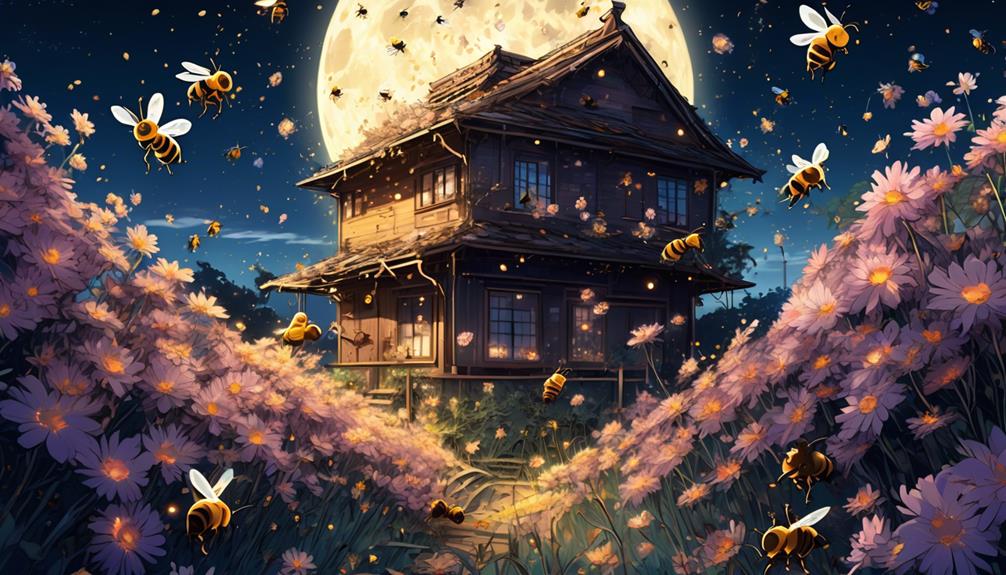
While understanding the difference in bee behavior from day to night is crucial, it's equally important to delve into specific factors that influence these nocturnal attacks.
Firstly, the presence of light influences bee behavior. Artificial lights can confuse bees, making them think it's daytime. This can result in them being active during the night and potentially becoming aggressive if they feel threatened. So, if you're hosting a backyard barbecue at night with lots of lights, you might be unknowingly inviting an unwelcome guest.
Secondly, certain species of bees, like the Africanized honey bee, are known to be more aggressive and might attack during the night if provoked. They're more defensive of their hives, especially if they perceive a potential threat.
Lastly, weather conditions can also play a part. On warmer nights, bees are more likely to be active and defensive. This is because bees don't regulate their body temperature as humans do and the warmth aids their activity.
The Role of Bee Vision
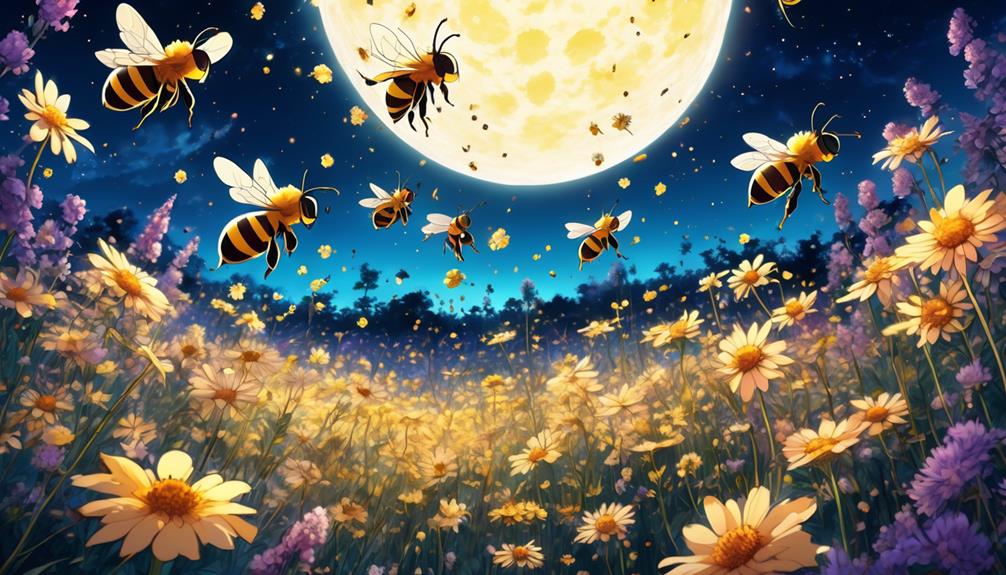
Despite their small size, bees have a complex visual system that plays a significant role in their behavior, particularly in their reactions to light and dark conditions. You might think of bees as daytime creatures, but their vision is attuned to twilight conditions, when the majority of bee species are most active.
Bees see in the ultraviolet spectrum, which means their world is vastly different from yours. They're not just detecting light intensity; they're also sensing its polarisation, which helps them navigate using the position of the sun, even when it's hidden behind clouds.
Their compound eyes are made up of thousands of tiny individual lenses, each capturing a sliver of the visual field. They can't see fine details as you can, but they're great at detecting motion. This helps them avoid predators and locate flowers swaying in the wind.
However, their vision isn't designed for darkness. When night falls, bees usually return to their hives and stay there until dawn. They rely more on their other senses, like touch and smell, during these hours.
Bees' Reaction to Threats at Night
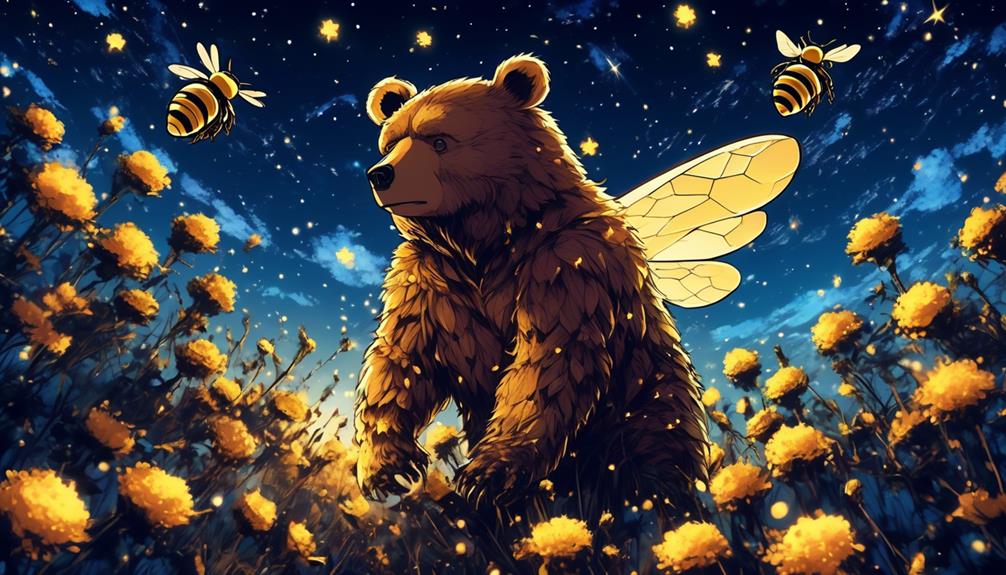
Given bees' limited night vision, you might be wondering how they react to potential threats after sundown. It's not as straightforward as you might think. Unlike their daytime behavior, bees don't engage in aggressive defense mechanisms at night. Their inability to see well in low light conditions hampers their response to danger.
Primarily, bees rely on their sense of smell to detect threats in the dark. If they sense a potential threat, they'll raise an alarm using pheromones. This signal alerts other bees in the hive about the possible danger, prompting a collective response. However, this reaction is less immediate and less aggressive compared to daylight hours.
Interestingly, bees are more likely to sting at night if they're directly provoked. A sudden disturbance or vibration to the hive can trigger an aggressive response, even in the dark. Additionally, bees are more prone to sting when they're outside their hive, as they feel more vulnerable.
Preventing Night-time Bee Attacks
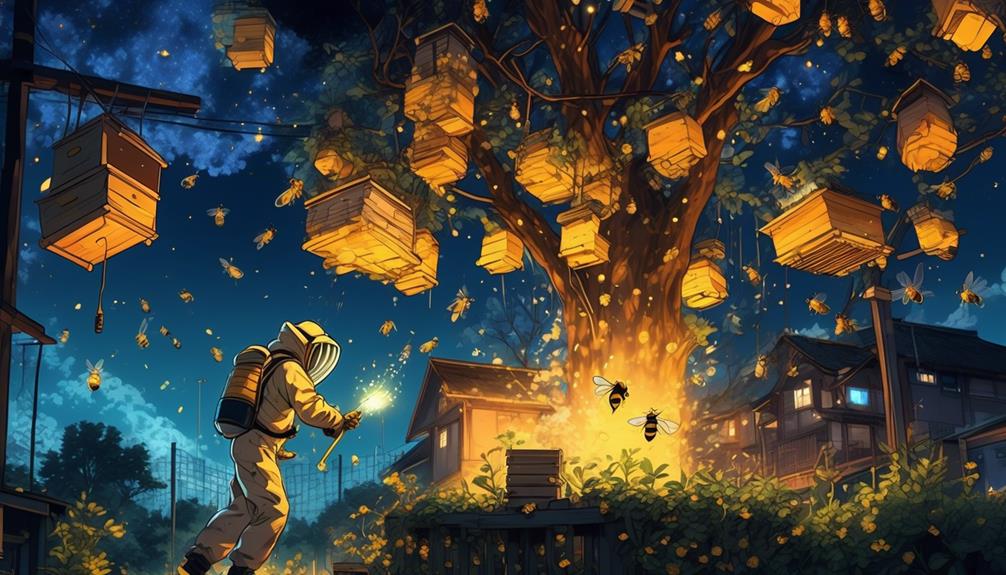
To minimize the risk of night-time bee attacks, it's essential to understand and implement certain preventive measures. Start by identifying potential bee habitats in your vicinity and avoid disturbing them, especially at night. Bees are more likely to attack when they feel their hive is threatened.
You should consider professional pest control services if you notice a hive near your residence. They have the right expertise and equipment to handle the situation without agitating the bees. Furthermore, avoid wearing dark or floral clothes at night as bees are attracted to these patterns and colors.
Here's a quick guide:
Action | Reason | Prevention Method |
|---|---|---|
Identify Bee Habitats | Bees attack when they feel threatened | Avoid disturbing identified habitats |
Professional Pest Control | In case of a hive near residence | Safe removal of hives |
Avoid Dark/Floral Clothes | Bees are attracted to these | Wear light-colored clothing |
Frequently Asked Questions
Can Bees Identify Their Target in Complete Darkness?
Yes, bees can identify their target in complete darkness. They've evolved to use their other senses when visibility is low. Bees possess a robust sense of smell, which helps them locate flowers for nectar even in the dark.
They also have a keen sense of vibration, allowing them to detect movement around them. However, their activity tends to decrease significantly at night, so it's less likely you'd encounter a bee in the dark.
How Do Bees Behave During Different Seasons at Night?
You're likely wondering about nocturnal behavior of bees.
In general, bees are diurnal, active during the day and resting at night. However, their behavior may slightly vary with seasons.
In colder months, they cluster together for warmth and remain in their hives, while in warmer months, you'll find occasional night activity. But bear in mind, they're not well-equipped for night navigation, so it's less frequent.
Are Certain Species of Bees More Likely to Attack at Night Than Others?
Yes, certain species of bees are more likely to attack at night than others. For instance, Africanized honey bees are known to be aggressive and can attack even in darkness. You'd find these bees more active at night, especially if they sense a threat to their hive.
But, remember, not all bees are nocturnal, and most prefer daytime activity. It's always crucial to avoid disturbing a hive, regardless of the time of day.
What Type of Injuries Can Be Caused by a Bee Attack at Night?
If you're unfortunate enough to get stung by a bee, you'll likely experience immediate pain, swelling, and redness at the sting site. Severe reactions can include difficulty breathing, hives, rapid pulse, and dizziness.
If you're allergic, you could go into life-threatening anaphylactic shock. Remember, it's not the time of day that changes the severity of a bee sting, but your body's reaction to it.
What Immediate Steps Should One Take if Attacked by Bees at Night?
If you're attacked by bees at night, immediately cover your face and run away quickly. Don't swat at them, it'll only agitate them more.
Find shelter in a closed space like a car or building. Once safe, remove any stingers by scraping them off, don't pull. Wash the area with soap and water, then apply ice to reduce swelling.
If you feel ill or have difficulty breathing, seek medical attention immediately, you might be allergic.
Conclusion
So, can bees attack at night? Yes, they can. While they're usually less active, certain factors like light, threat and their vision can provoke a nocturnal attack.
But don't worry, understanding their behavior and taking preventive measures can help you avoid these situations. Be careful, be respectful, and remember, bees are crucial to our ecosystem, so let's coexist peacefully.



